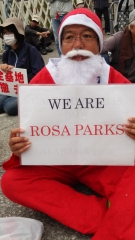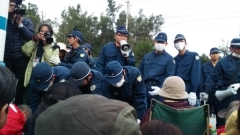25 May 2017
Film "Race" Surprising facts in 1936 Olympic game
The film "Race" features life of Jessie Owens, an Afro-American truck and field athlete who won 4 gold medals in 1936 Berlin Olympic game. It was a time that segregation was legal in US and Nazis ruled Germany.
What surprised me was at that time, there was a boycott movement for joining the game. Jessie Owens was asked to boycott the game by NAACP, prominent advocate group for Black people.
But he went to Berlin to participate in the game along with two Jewish athletes, whom Nazis were reluctant to welcome. AOC, American Olympic Committee decided to let US team participate in although opinion among committee members were split. The film implies it was due to the committee leader who collaborated with Nazi-Germany in exchange of big business deal.
Then in the game, two notorious events occurred. In the long jump competition, Owens fouled the jumping in first two of the 3 tries in qualification match. But his German competitior, Luz Long advised him to step back a foot behind the measurement start point. The he did and passed the qualification to the final. Then he won the gold medal marking the Olympic record. After the awarding ceremony, Owens and Long walked on the truck together holding arms looking like good friends. It was very much anti-Nazis action. A white man and a Black man holding arms together walking. Long stood on the podium raising his right hand in the form of Hitler salute. In addition, in that competition, in the third place, bronze medalist was Japanese, Tajima. Actually Japan had medalists in truck and field competition in 1930's. That is far different from what Japanese truck and field society has been lately.
The other thing was two Jewish American athletes in relay competition was removed from the team just in advance of actual competition. It was due to Nazis demand to promote their anti-semitism ideology in the game. AOC leader who collaborated with Nazis was blackmailed to do so, otherwise, the collaboration would be exposed to the public.
Then Owens became a replacement for one of the two atheletes. Then his team won the relay competition.
After he got home, he was welcomed in a parade by a million of people on the street in New York. But he was not allowed to enter to a hotel in which a celebration party was held, so he had to go through back door of the hotel.
Kind of surprising stories in that era. 3 years after the Olympic game, Germany started the 2nd world war. Japan became an ally with Germany. 3 years after the war started, Long, who became Owens' friend died in the war, leaving the message to Owen that he wanted Owen to take care of his son.
How dramatic the stories were! How ugly and beautiful the things were!
00:42 Posted in Deutschland, Film, Politics, Society, Sports | Permalink | Comments (0) | Tags: history, racism
20 February 2017
German film "Er ist wieder da" (Look who's back)
The German title means "He is back again." In Japan it was titled "Hitler Returns."
The story is based on a novel of the same title. Adolf Hitler time slipped to 21st century Berlin and became a popular comedian. His comments were provocative but come with humor. People considered him imposter of Hitler, but he was a real figure.
At first it seems revival of his appearance looked comical, but in the end, it was found very serious matter. A lot of innocent people were killed by his action. Not a laughing matter.
But this reflected current trend of the world.
The very example is US President, Donald Trump who took office last month.
He is anti-Muslim, anti-Mexican, racist, sexist and America First, especially white men First. Kind of horrific figure after first Afro-American President retired.
But that was a reality of America. America has been that way from the past. He said he wanted to build the wall on Mexican border. No more Hispaics. But until 1965, America had accepted mostly white immigrants from Europe.
Liberal and cosmopolitan America is very recent phenomenon which now started to fade by this man.
In 1960's America was very rich, and countering Russian communism so liberal policy prevailed.
Today America is no longer a rich nation. Cannot afford generousity and diversity.
Like Hitler's slogan, "One Nation in One State." Americans, especially whites want to go back to White Anglo Sacson Protestant America.
Just like America, other nations follow suit. Europeans have become anti-Muslim. They are basically predominantly Christian people. Why should they accept non-Christian immigrants or refugees for humanitarian purpose? Immigrants bring different culture and language and do not easily adopt to traditional community.
In every nation, priority is traditional majority. Race, culture, and language surely matter.
Society cannot be easily changed. When things change too quickly, it is natural that backlash comes.
Change should have been done at appropriate speed.
Whether it is good or evil, it is the law of human nature. Japan accepts very small number of immigrants or refugees compared to US or European nations. We are really natural and honest nation. But cannot be proud of that.
As for the film, I like the ending scene that Hitler waved his hand to the crowd with the song of the same title. It was 1960's German ballard song. That was really nice. I was lucky to know this song. I am studying German by this song.
23:56 Posted in Deutschland, Film, Music, Politics, Society, USA issues | Permalink | Comments (0) | Tags: history, nazis, racism, trump
20 February 2016
Disney's film "Song of the South" Not as racist as thought to be
The film's portrayal of the 19th century South was unrealistic. Although the story took place after the Civil War, portrayal of Blacks was not bad.
Until civil rights era, the old South was wrongly portrayed as if Black people were happy serving white people.
In that film that was the way they were portrayed. Funny thing was they had friendly relationship with their white family. In the first scene, a Black servant woman sat right next to a white boy facing his parents in a carriage. That woman was played by the same actress who played Mammy in the film "Gone with the wind." However, that thing never happened in the old South. Blacks were supposed to sit in the back of a carriage. "Gone with the wind" has the same portrayal as well. Mammy was like mother to white family's daughter.
Maybe that was the problem. The film depiction of the old South was wrongly better than real history.
Great thing about the film was combination of real scene and animation. It is as good as modern time computer graphic technique.
The story of rabbit gives us lesson of how to handle troubles. Even you get away from some troubled place, you never can get away from troubles in life, so you have to deal with it and be smart.
I think that was the core message in the film.
23:44 Posted in Film, Media, Society | Permalink | Comments (0) | Tags: afro-american, racism
23 January 2016
Being Rosa Parks at US Marine Camp Schwab in Okinawa
From last December to beginning of this month, I was in Okinawa to join protest activities of locals who are opposed to construction of new military base runways in US Marine Camp Schwab in Nago city, Okinawa.
Why we are opposed has been described in this blog for years. Please read the posts clicking the tag Okinawa.
Especially, this article gives you outline of what is going on there. My letter to US Ambassador to Japan, Caroline Kennedy, daughter of JFK.
While I joined the protest, I used picket board that says "We are Rosa Parks."
Rosa Parks as you may know, is the symbol of refusal to unjust matters. A Black woman who refused to give front seat to white passengers in a bus and was arrested in Montgomery, Alabama, 1955. But her action sparked bus boycott protest led by Dr. Martin Luther King. 9 years later, civil rights Act was passed. A year after that, Dr. King led peaceful march from Selma to Montgomery to call for enactment of voting rights bill. Black people in the Southern states were blocked at voting registration office.
What surprised me was marines reaction to the picket board. Young marines looked positive. I asked one security guard, who was a young white man inside the camp premise, if he knew what it meant. He said smilingly "I know what it means." One Black man driving a car looked at me, smiled and gestured his support. "Rosa Parks" is known to every American.
I saw the movie, "SELMA" after I got back home in Tokyo. It was a great movie. I found how hard it was for him to do this. A lot of people were hurt and even killed. But he and his followers never gave in.
Interesting thing to know was Dr. King was a very smart man so that he once retreated the march to avoid bloodshed by local police. He filed lawsuit against the Alabama state that bans peaceful march. Then the court made an order to allow the march. He prevailed.
Just like Rosa Parks and Dr. King. we did peaceful protest at the gate of Camp Schwab. Sit-in-protest at the gate that construction vehicles passed through.
Police came and took us from the gate. We never foughtback but just kept sitting down on the ground. I was carried by the police from shoulders to toes.
Protestants do every day. It has been going on for years. There were several injuries and arrests. But we still keep doing this. We cannot stop the construction but at least we are delaying that. We will never give in.
While I joined in the sit-in protest, I really felt like Rosa Parks, Dr. King and their followers in their times. We may be backed up by their souls.
Thank you, Dr. King and Ms. Rosa Parks. I am proud of being part of this protest activity.
The US government should hear the voice of protestants and halt such stupid construction project. It is as stupid as segregation laws. It is actually what is happening in your own yard.
15:28 Posted in Ecology, Film, Japan News, Politics, Society, US-Japan relationship, USA issues | Permalink | Comments (0) | Tags: history, military, okinawa, racism, afro-american







